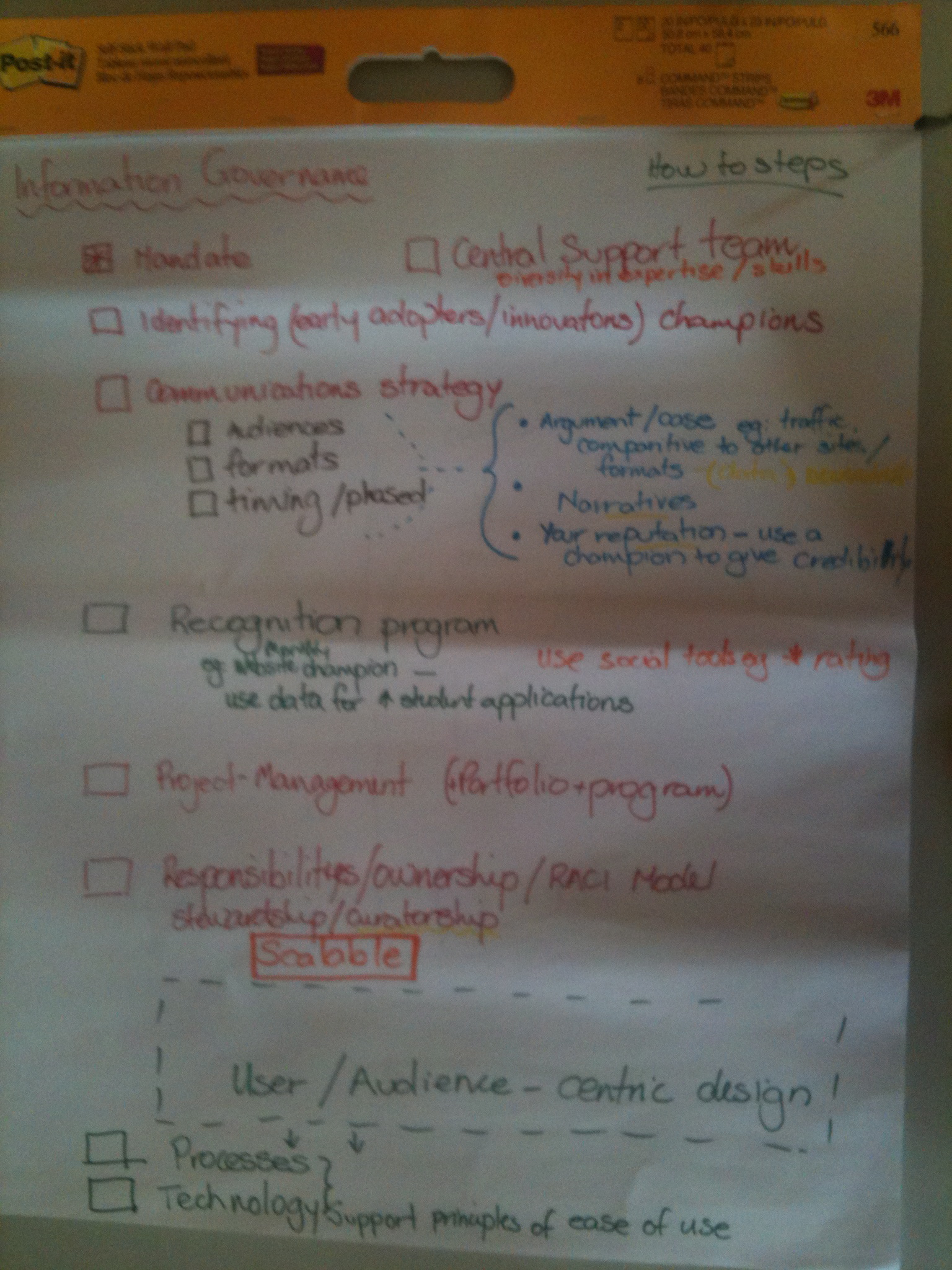On 11 April 2011, I attended a workshop on information governance facilitated by Matt Moore (Innotecture) with support from Keith De La Rue (AcKnowledge Consulting).
Part of the session was run along similar lines to a world cafe. Two main themes discussed were "getting buy-in" and "getting started". Following are the key thoughts from the "getting started" conversations.
Getting started : an information governance checklist
þ Mandate
Ensure that a mandate for information governance is obtained from and endorsed by senior management.
þ Central support team
Create an information management central support team composed of people with a diversity of expertise and skills across information / data / knowledge / change / project management and subject matter knowledge and expertise.
þ Clearly defined responsibilities
Identify and charting responsibilities and ownership of information and information processes based around the RACI model
R-responsible
A-accountable
C-consulted
I- informed
þ Management, stewardship and curatorialship of information
Consider information management in the light of stewardship and curatorialship.
þ Identify champions
Identify and nurture early adopters, innovators and enthusiasts of good information practices. These are the people who will help embed good information practices across the organisation.
þ Communications strategy
Develop a robust, but flexible communications strategy based around:
þ Align projects
Not only use a project management methodology for management of projects, but ensure that program management is occurring across the organisation and portfolio management is being undertaken by senior management.
þ Scalability and flexibility
Start small, but ensure your projects and programs are scalable and flexible.
þ The user is at the centre
Projects and programs, processes and practices are designed around the user and are modified according to the audience; remembering that not all users are the same (one size does not fit all).
This checklist is not exhaustive; however considering it emerged from two 15-20 minute discussions, it's pretty good!
Part of the session was run along similar lines to a world cafe. Two main themes discussed were "getting buy-in" and "getting started". Following are the key thoughts from the "getting started" conversations.
Getting started : an information governance checklist
Ensure that a mandate for information governance is obtained from and endorsed by senior management.
þ Central support team
Create an information management central support team composed of people with a diversity of expertise and skills across information / data / knowledge / change / project management and subject matter knowledge and expertise.
þ Clearly defined responsibilities
Identify and charting responsibilities and ownership of information and information processes based around the RACI model
R-responsible
A-accountable
C-consulted
I- informed
þ Management, stewardship and curatorialship of information
Consider information management in the light of stewardship and curatorialship.
þ Identify champions
Identify and nurture early adopters, innovators and enthusiasts of good information practices. These are the people who will help embed good information practices across the organisation.
þ Communications strategy
Develop a robust, but flexible communications strategy based around:
- audience / stakeholder (message based on segment)
- format (vary depending on audience)
- timing/phase (dependent on phase of project).
- argument (the case) which is based on data, e.g. comparative website traffic stats
- narratives (the story) which is based on the personal account, e.g. outcome of using quality information
- reputation (credibility) achieved by using a champion or someone of credible standing to the audience being presented to.
þ Recognition program
Create a program that recognises the achievements of champions or people doing good practice. Add social tools, such as star ratings, to make it easy to engage a broad range of people with the recognition process. (Note: This program should not to be confused with a monetary rewards program.)
þ Align projects
Not only use a project management methodology for management of projects, but ensure that program management is occurring across the organisation and portfolio management is being undertaken by senior management.
þ Scalability and flexibility
Start small, but ensure your projects and programs are scalable and flexible.
þ The user is at the centre
Projects and programs, processes and practices are designed around the user and are modified according to the audience; remembering that not all users are the same (one size does not fit all).
This checklist is not exhaustive; however considering it emerged from two 15-20 minute discussions, it's pretty good!

No comments:
Post a Comment